





INSPIRING MINDS ADVANCING RESEARCH WITH SOCIETAL IMPACT



















I am so excited to be starting my journey as the Helen and William O’Toole Dean of the Villanova School of Business (VSB). Although I have been at VSB for 28 years, transitioning into this leadership role presents exciting challenges and opportunities. The core ethos of Villanova—Veritas (Truth), Unitas (Unity) and Caritas (Love)—is enduring and foundational to everything we are and do. I am committed to leading VSB with our mission as our guide and an eye towards the future of business education.
The University and VSB have identified high-quality research as a key priority in our respective strategic plans. This aspiration goes beyond simply having faculty publish their work in the most respected journals. We want to transcend that worthy goal by reaching beyond it to encourage research that really matters, with relevance and true societal impact.
This publication profiles just a slice of our faculty who are undertaking such research. Their work touches individuals, organizations, communities and society at large in a direct and meaningful way.
Here at VSB, we are fortunate to have a community of teacher-scholars who care deeply about our students, who are thought leaders in their respective fields, and who seek to engage with and influence a wide range of stakeholders to help make the world a better place. This publication is but one way we demonstrate that commitment.
The Helen and William O’Toole Dean Professor of Economics


Senior Associate Dean for Research, Faculty Advancement, and Global Engagement
Villanova School of Business

Associate Dean of Diversity, Equity and Inclusion
Associate Professor of Marketing and Business Law
Villanova School of Business
We believe academic scholarship dedicated to societal impact—both positive and negative —is important for institutions of higher learning seeking to contribute to improving human flourishing and well-being.


Scholarly professional associations such as the Association to Advance Collegiate Schools of Business, the Academy of Management and the Research Excellence Framework are increasingly urging business schools and their faculty to direct attention toward the impact of their teaching/learning, service and research activities. Drawing inspiration from Villanova’s unique Augustinian values and intellectual tradition, at the Villanova School of Business (VSB), one of our three overarching research objectives is to advance research with societal impact. We define societal impact broadly to include scholarship that explores topics related to environmental, social and corporate governance (ESG) issues, including, inter alia, public policy; the role of business in society; ethics and social responsibility; inequality, diversity, equity and inclusion; and responsible servant leadership.
In this edition of Inspiring Minds, we profile a sample of our faculty who are actively engaged in research with societal impact, including those who focus on issues related to diversity, equity and inclusion (DEI). We believe academic scholarship dedicated to societal impact—both positive and negative—is important for institutions of higher learning seeking to contribute to improving human flourishing and well-being. In addition, we see no trade-off between the quality and scholarly impact of research and its ability to show demonstrable societal impact. In fact, these two aspirations can be fully complementary.
At VSB, we are committed to supporting faculty in their desire to contribute new knowledge and disseminate that knowledge to interested stakeholders, including companies, their managers and their consumers; nonprofit organizations, their leaders and their clients; and governmental officials charged with developing public policies and the constituents who are impacted by those policies. We view these efforts as part of the vital role of universities and business schools in developing leaders for a better world.

We are living in a time of rapid social, geographical, technological and political change. When facing uncertainty and a lack of common ground, we can promote science as the way to cut through the clutter. Through rigorous scientific inquiry, we can work not only to identify problems and their sources, but to design sustainable solutions that promote well-being for people, business and society.

Block, L., Vallen, B., & Warlop, L. (2022). Consumer centered policy inquiries: A call to explore policy through a consumer lens and consumers through a policy lens. Journal of Public Policy & Marketing, 41, 216-220.
Bublitz, M.G., Peracchio, L., Davis, B. Edson Escalas, J. Hansen, J. Miller, E., Vallen, B. & White, T. (2022), Stronger together: Developing research partnerships with social impact organizations. Journal of Consumer Affairs, 56, 1028-1045.
Block L., Vallen B., & Austin, M. P. (2022). Food waste (mis) stakes: The role of (mis)perception and (mis)estimation in food waste. Current Opinion in Psychology, 46. doi: https://doi.org/10.1016/j.copsyc.2022.101327.
Finkelstein, S., Vallen, B., Boland, W.A., Sherman, G., Connell, P., & Feemster, K. (2021). When taking action means accepting responsibility: Omission bias predicts parents’ reluctance to vaccinate due to greater anticipated culpability for negative side effects. Journal of Consumer Affairs, 55, 1660-1681.
Iacocca K., & Vallen, B. (2021). Using analytics to gain insights on U.S. prescription drug prices: An inductive analysis. Journal of Public Policy & Marketing, 40, 538-557.
Finkelstein, S. R., Boland, W. A., Vallen, B., Connell, P. M., Sherman, G. D., & Feemster, K. A. (2020). Psychological reactance impacts ratings of pediatrician vaccine-related communication quality, perceived vaccine safety, and vaccination priority among U.S.. parents. Human Vaccines & Immunotherapeutics, 16, 1024-1029.
Scott M., & Vallen, B. (2019). Expanding the lens of food well-being: An examination of contemporary marketing, policy, and practice with an eye on the future. Journal of Public Policy & Marketing, 38, 127-135.
Block, L. G., Keller, P. A., Vallen, B., Williamson, S., Birau, M. M., Grinstein, A., Haws, K. L., LaBarge, M. C., Lamberton, C., Moore, E. S., Moscato, E. M., Reczek, R. W., & Tangari, A. H. (2016). The Squander Sequence: Understanding food waste at each stage of the consumer decision making process. Journal of Public Policy & Marketing, 35, 292-304.
Irmak, C., Vallen, B., & Rosen, S. (2011). The impact of product name on dieters’ and nondieters’ food evaluations and consumption. Journal of Consumer Research, 38, 390-405.
 BETH VALLEN, Ph D
Professor, Marketing & Business Law
BETH VALLEN, Ph D
Professor, Marketing & Business Law
Marketing can be a powerful force for social good. This might seem at odds with common views of the practice, but it’s what drew Beth Vallen, PhD, to marketing and what maintains her interest in it. Dr. Vallen majored in marketing at Lehigh University, where she was part of a program pairing students with faculty to work on research in business. This experience introduced her to academic research and scientific inquiry. After several years as a management consultant in New York City, Dr. Vallen returned to the classroom as a professor, earning her MBA and PhD from Baruch College and The City University of New York. She is currently a professor of Marketing at Villanova University, and in 2022 Poets & Quants named her one of the Top 50 Undergraduate Professors. Dr. Vallen’s work has been published in top marketing journals, including Journal of Consumer Research, Journal of Consumer Psychology, and Journal of Marketing & Public Policy. Given her focus on issues related to well-being, her work is also featured in psychology, nutrition and public-health journals. Dr. Vallen prioritizes research with impact; she has engaged in cross-disciplinary projects with coauthors from the medical and public-health domains. This relational-engagement approach to research ensures that her work in marketing is rooted in an on-the-ground understanding of the problem.
Her early career work was centered on healthy eating, focusing on how marketing stimuli impact decisionmaking and outcomes. Her work has provided insights into the strategies that consumers, marketers and policy makers might utilize to tackle current global issues ranging from overconsumption to food insecurity. In one project, published in Journal of Consumer Research, Dr. Vallen and her colleagues show that merely identifying a food by an
unhealthy name leads those who prioritize healthy eating to perceive it as less healthful and more tasty than when the name is arbitrarily changed to signal healthfulness. This sheds light on the subtle cues that impact food choice and supports FDA regulation related to product naming conventions.
Food disposal is another focus of Dr. Vallen's work. Much of the consumable global food supply is wasted, and this occurs at the organizational, household and consumer level. Dr. Vallen’s work explores the psychological factors that underlie these complex issues, focusing on household and individual waste. Her 2022 invited paper in Current Opinion in Psychology has helped bring this discussion and research agenda outside the field of marketing to reach a broader base of researchers. Further, she co-edited a 2019 special issue of Journal of Public Policy & Marketing featuring papers examining food well-being and articulating implications for policy makers.
Dr. Vallen’s most recent work has centered on decisions related to health care, including vaccination and prescription drug prices. To explore childhood vaccinations, Dr. Vallen worked with marketing academics, psychologists and physicians. Two articles that explore biases that lead to skipped or delayed vaccines are published in Human Vaccines and Immunotherapeutics and Journal of Consumer Affairs. While the medical community is the primary readership of the first publication, the latter reaches a marketing audience—the goal is both to inform physicians about potential biases and to begin a dialogue in the marketing domain to address them with research that poses evidence-based solutions.
To reach beyond academia and engage practitioners, Dr. Vallen co-hosts a monthly webinar that features research partnerships across disciplines and interests. She also co-authored an article aimed at providing academics and social-impact organizations with a roadmap for collaborating on projects that advance marketing practice. Dr. Vallen’s recent appointment as co-editor of Journal of Public Policy & Marketing is a reflection of her commitment to research that drives impact. The journal focuses on different aspects of the policy-making process that relate to marketing, such as cannabis legalization; advances in technology and its effects on misinformation, the perception of truth, and national security; and citizen and corporate social-justice activism.
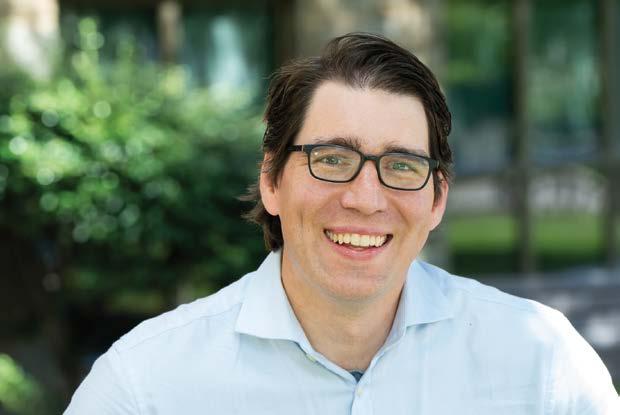
David Anderson, PhD, grew up surrounded by medicine and scientists. His mother was an emergency room nurse, his father is a biochemist, and Dr. Anderson is a fourthgeneration PhD and professor. As a child, Dr. Anderson was curious about and interested in patterns, machines and using math to make the world a better place; for example, he did a high school project analyzing traffic flow under different stoplight timing patterns. It was natural that he would major in applied mathematics while at William and Mary and then go on to receive his doctorate in operations management from the University of Maryland.
Dr. Anderson’s research spans a wide range of topics and approaches and has been published in the very highest quality journals, such as Production and Operations Management, Organization Science, Nature, Harvard Business Review, and Annals of Internal Medicine. Despite this diversity, his research has one common thread: it all uses math and data to explain and illuminate real-world challenges facing society.
His work on health care has addressed issues such as how resource constraints impact medical decision-making, how patient characteristics affect care decisions and outcomes, and how medical information can be used to identify patients at risk of negative outcomes. One project, leading to publications in Health Care Management Science and PharmacoEconomics, showed that veterans treated for various conditions responded well to pain medication prescribed for three days or less, but that addiction risk increased substantially as the initial prescription length increased. This work was conducted in conjunction with the Army and helped inform the 2022 VA/DoD clinical practice guidelines for the use of opioids.
Another study, published in Health Care Management Science, showed that when post-operative recovery beds reach high levels of utilization, discharge rates increase. Further, patients discharged on those days were significantly more likely to be readmitted within 30 days. Yet another, published in Decision Science, revealed that online reviews of doctors are effective screens for quality. Recently, Dr. Anderson and colleagues showed that when Uber arrives in a city, demand for emergency medical services (EMS) falls because patients use Uber instead of calling 911. EMS responds to the reduction in demand by doing more procedures on each patient, but this added care has no positive impact on mortality.
Dr. Anderson’s research also focuses on pay equity and its organizational consequences. He has shown that pay gaps exist and persist in a wide range of sectors and organizations and that these gaps negatively impact employee engagement and satisfaction. One study, published in Organization Science, explored the incentives embedded in common implementation of equal pay for equal work laws and discussed better approaches for auditing for pay equity. Another, published in Production and Operations Management, identified pros and cons of different approaches for closing demographic pay gaps and offered recommendations to managers on how to incorporate fairness concerns.
Dr. Anderson’s current projects explore the effect of the gender pay gap in the federal government on pay satisfaction, job satisfaction and perceived fairness. Along with his PhD mentor, Dr. Anderson co-founded a company that provides services to help organizations measure, address and report their demographic pay gaps. His work has been used to help over 100 companies employing over half a million people. A current project explores the impacts of pay transparency laws in California, Colorado and New York on job posting behavior, pay disclosure, and employer competition and coordination.
In addition to his work in health care and gender pay, Dr. Anderson has current projects exploring topics like the relationship between drug eradication efforts and violence in Colombia, quantifying data quality, and implementing algorithm transparency regulations amid intellectual property concerns. He also does sports analytics research and teaches a sports analytics class. Along with Joshua Mould ’23 CLAS, Dr. Anderson won the 2021 Carnegie Mellon Sports Analytics Conference research competition, and in 2023, Poets & Quants named him one of the Top 50 Undergraduate Professors.
Analytics is a great toolkit that can be applied to a wide array of real-world problems. My prediction and optimization expertise, and my curiosity about practical problems real people face, have allowed me to address problems across a range of domains.

REPRESENTATIVE PUBLICATIONS
Anderson, D., Bjarnadóttir, M. V., & Ross, D. G. (2023). Bridging the gap: Applying analytics to address gender pay inequity. Production and Operations Management. doi: https://doi.or g/10.1111/poms.13944.
Anderson, D. R., Aydinliyim, T. Bjarnadóttir, M. V, Çil, E.B., & Anderson, M.R. (2023). Rationing scarce healthcare capacity: A study of the ventilator allocation guidelines during the COVID-19 pandemic. Production and Operations Management. doi: https://doi.org/10.1111/ poms.13934.
Anderson, D., Bjarnadóttir, M. V., & Ross, D. G. (2022). Using people analytics to build an equitable workplace. Harvard Business Review. Retrieved from https://hbr. org/2022/01/using-people-analytics-to-build-anequitable-workplace
Anderson, M. R., Geleris, J., Anderson, D. R., Zucker, J., Nobel, Y. R., Freedberg, D., ... & Baldwin, M. R. (2020). Body mass index and risk for intubation or death in SARSCoV-2 infection: A retrospective cohort study. Annals of Internal Medicine, 173, 782-790.
Lantzy, S., & Anderson, D. (2020). Can consumers use online reviews to avoid unsuitable doctors? Evidence from RateMDs. com and the Federation of State Medical Boards. Decision Sciences, 51, 962-984.
Bjarnadóttir, M. V., Anderson, D. R., Prasad, K., Agarwal, R., & Nelson, D. A. (2020). The value of shorter initial opioid prescriptions: A smulation evaluation. PharmacoEconomics, 38, 109-119.
Anderson, D., Bjarnadóttir, M. V., Dezső, C. L., & Ross, D. G. (2019). On a firm’s optimal response to pressure for gender pay equity. Organization Science, 30, 214-231.
Anderson, D., Bjarnadóttir, M. V., & Ross, D. G. (2019). Why companies’ attempts to close the gender pay gap often fail. Harvard Business Review. Retrieved from https://hbr.org/2019/01/why-companies-attempts-toclose-the-gender-pay-gap-often-fail.
Guenther, U. P., Yandek, L. E., Niland, C. N., Campbell, F. E., Anderson, D., Anderson, V. E., ... & Jankowsky, E. (2013). Hidden specificity in an apparently nonspecific RNAbinding protein. Nature, 502, 385-388.
Anderson, D., Price, C., Golden, B., Jank, W., & Wasil, E. (2011). Examining the discharge practices of surgeons at a large medical center. Health Care Management Science, 14, 338-347.
I’m really hopeful that by putting in dedicated effort and collaborating closely with experts from various fields, I can bring more solutions to complex challenges related to diversity, equity and inclusion as well as show how effectively managing diversity can help firms address key challenges they face.

Post, C., Lokshin, B., & Boone, C. (2022). What changes after women enter top management teams? A genderbased model of strategic renewal. Academy of Management Journal, 65, 273-303.
Gloor, J. L., Mestre, E. B., Post, C., & Ruigrok, W. (2022). We can’t fight climate change without fighting for gender equity. Harvard Business Review, 1-9. Retrieved from https://hbr.org/2022/07/we-cant-fight-climate-changewithout-fighting-for-gender-equity
Wowak, K. D., Ball, G. P., Post, C., & Ketchen, D. (2021). The influence of female directors on product recall decisions. Manufacturing and Service Operations Management, 23, 895-913.
Mitra, A., Post, C., & Sauerwald, S. (2021). Evaluating board candidates: A threat-contingency model of shareholder dissent against female director candidates. Organization Science, 32, 86-110.
Post, C., Lokshin, B., & Boone, C. (2021). Adding women to the c-suite changes how companies think. Harvard Business Review. doi: https://doi.org/10.1016/j. copsyc.2022.101327.
Neville, B., Post, C. & Ward. A. (2019). Board independence and corporate misconduct: A cross-national meta-analysis. Journal of Management, 45, 2538-2569
Cardon, M. S., Post, C., & Forster, W. R.. (2017). Team entrepreneurial passion: Its emergence and influence in new venture teams. Academy of Management Review, 42, 283-305.
Post, C., & Byron, K. (2015). Women on boards and firm financial performance: A meta-analysis. Academy of Management Journal, 58, 1546-1571.
Post, C. (2015). When is female leadership an advantage? Coordination requirements, team cohesion and team interaction norms. Journal of Organizational Behavior, 36, 1153–1175.

Born in Washington, DC, and raised in Switzerland and Tunisia, Corinne Post, PhD, completed her BS in organization management and master’s in international management from HEC, University of Geneva (Switzerland) and HEC, University of Lausanne (Switzerland) respectively. She received her PhD in organization management from Rutgers University. Prior to joining academia, she was an IT analyst and human resource specialist for Accenture. These formative years shaped her perspectives on working with and across differences, instilling a sensitivity to diversity that became a defining feature of her academic career.
Dr. Post’s research examines when and how diversity enables group and organizational performance and how social identity affects career trajectories. Her work is published in leading academic journals including Academy of Management Journal, Academy of Management Review, Administrative Science Quarterly and Journal of Applied Psychology. Dr. Post has a special interest in boards of directors and executive teams: Who gets appointed to them? What changes when they become more diverse? How can decisions be traced back to diversity among leaders?
She has presented her research at academic conferences and professional organizations internationally and earned a grant from the National Science Foundation. In 2022, her influence on the field of diversity, equity and inclusion studies was recognized by the Academy of Management with the Sage Award for scholarly contributions. Her research has been cited in a wide range of professional and popular outlets such as Harvard Business Review, Financial Times, Forbes, Fortune, The Wall Street Journal and The Washington Post Dr. Post’s work on women leaders on corporate boards has been especially impactful. A 2020 bibliometric analysis of board diversity research1 identifies her as the second
most-cited author on board diversity and several of her papers are among the most-cited papers on women and corporate boards. Her research on women on boards and firm performance was cited in the research report of the European Parliament, which in 2022 resulted in EU legislation requiring firms listed on European stock exchanges to ensure that at least 40% of non-executive directors or at least 33% of all directors be women.
One project published in Academy of Management Journal and Harvard Business Review demonstrated a new mechanism linking the appointment of women executives to the top management team with firm innovation. When women appointees join top management teams, the C-suite’s way of thinking changes in two ways: it becomes more open to change and less risk-seeking. As a result of these changes in thinking, firms’ innovation strategies rely less on an acquisitive approach and more on building innovative capabilities internally. The HBR article drew widespread coverage and Dr. Post was quoted or cited by National Public Radio and the National Association of Manufacturers, among others.
In another study, published in Manufacturing and Service Management Operations, she and colleagues investigated whether adding women to a board influences product-recall decisions. Using data on 4,271 medical product recalls from 2002 to 2013 across 92 publicly traded firms regulated by the Food and Drug Administration (FDA), Dr. Post and her co-authors found that adding women to a board changes whether and how quickly the firm recalls defective products. Specifically, adding one woman to a previously all-male board speeds up recalls of the most dangerous defects by 28 days (a 35% acceleration). The study has had a sizable impact on practice. It won the 2022 Responsible Research in Management Award from the Academy of Management Fellows and the Community for Responsible Research in Business and Management and was a finalist for the 2023 Manufacturing and Service Management Operations Best Responsible Research Award. Furthermore, a separate line of inquiry led by Dr. Post, exploring the benefits of thought diversity for innovation, garnered recognition at the highest levels of government. In his 2024 Economic Report of the President, President Biden cited this groundbreaking work for its pivotal insights in relation to humans working with AI.
In addition to her scholarly contributions, Dr. Post is dedicated to bridging the research-practice divide. As a Forbes contributor, she draws on her 20+ years of research and teaching experience around diversity management to comment on board and TMT leadership issues in the news and to disseminate insights and implications from cutting-edge strategic leadership research. Her columns are often selected as Forbes’ “editor picks” and have examined topics like “What Happens When CEOs Get Sick?” and “How REI And Mattel Fuel Innovation With Diversity, Equity, And Inclusion.” The full list of her stories can be found at https://www.forbes.com/ sites/corinnepost/
1 Baker, Pandey, Kumar, & Haldar, 2020

Taking annual visits to the Catskills and growing up in Long Island, New York, Chris Jeffords, PhD, was always passionate about nature and the outdoors. His love for preserving the natural environment, however, grew out of a love for his family and their health. Both of his kids were born prematurely, one with chronic respiratory complications, and his wife is a cancer survivor living with a chronic disease. Attempting to thrive with his family amid these circumstances, Dr. Jeffords felt compelled to focus his teaching, research and service on environmental health and sustainability issues.
After pursuing undergraduate and graduate degrees in economics, Dr. Jeffords obtained his MS and PhD in agricultural and resource economics at the University of Connecticut, where he remains a faculty affiliate. Dr. Jeffords also co-founded the Sustainability Studies Program and minor at Indiana University of Pennsylvania. Dr. Jeffords is now an associate teaching professor in Economics at VSB, where he has successfully cross-listed an environmental economics course for students within the Department of Geography and the Environment. In addition, Dr. Jeffords offered an advanced environmental economics capstone in spring 2024. He integrated campus and community projects into each course.
His research agenda spans topics in sustainability and environmental economics and justice, and his current research incorporates student contributions in the form of co-authorship or research assistance. His publication record includes individual and co-authored articles in outlets including Ecological Economics, Journal of Environment and Development, Human Rights Quarterly, Journal of Human Rights and the Environment, Economics
Bulletin, and Letters in Spatial and Resource Sciences. He also has publications in edited book volumes through publishers such as Cambridge University Press and Oxford University Press, and he serves as an assistant editor on two interdisciplinary journals.
Dr. Jeffords is also active within the community. He is the founder and co-director of Science on Tap – Phoenixville (SOT), which is a monthly series of family-oriented science education talks. Each gathering features a brief presentation by an expert followed by a spirited conversation in a casual environment. The series has featured faculty members from local universities as well as local experts from various nonprofit and private-sector organizations. Recently, Dr. Jeffords and co-director Jen Santoro, PhD, secured funding to hire a student research assistant to lead a community survey, perform a comprehensive analysis of the series and co-author a research report.
Dr. Jeffords also finds it increasingly important to engage the community through media. He recently published an op-ed in The Hill related to President Biden’s executive order on environmental justice. Together with Drs. Steven Goldsmith and Jen Santoro, he co-authored an op-ed in the Philadelphia Inquirer to address the issues associated with pollutants emitted into the Delaware and Schuylkill Rivers. He also wrote an op-ed in the NY Daily News to support amending NY’s constitution to include environmental human rights—an action that became part of the constitution in 2022. In addition, his research and service were featured in the VSB Inspiring Minds podcast and the Jive Talking podcast and as part of the TEDxVillanovaU series on sustainability. Dr. Jeffords has also been quoted in Newsweek and BBC Future
Due to his continued efforts to promote sustainability and incorporate Villanova’s mission into his approach and scope of work, Dr. Jeffords was the 2023 Rising Star Recipient of the inaugural VSB Augustinian Values and Excellence in Mission Award.
Jeffords, C. (2021). On the relationship between constitutional environmental human rights and sustainable development outcomes. Ecological Economics, 186. doi: https://doi.org/10.1016/j.ecolecon.2021.107049
Gellers, J., & Jeffords, C. (2019). Environmental rights in the Asia Pacific region: Taking stock and assessing impacts. Asia Pacific Journal of Environmental Law, 22, 190-206.
Jeffords, C., Thompson, A., & Gwinn, J. (2019). The luxury of environmental concern in the U.S.: Evidence from Google Trends data. Letters in Spatial and Resource Sciences, 12, 121-132.
Jeffords, C., & Thompson, A. (2019). The human rights foundations of an EKC with a minimum consumption requirement: Theory, implications, and quantitative findings. Letters in Spatial and Resource Sciences, 12, 41-49.
Gellers, J., & Jeffords, C. (2019). Environmental determinants of Chinese development finance in Africa. The Journal of Environment and Development, 28, 111-141.
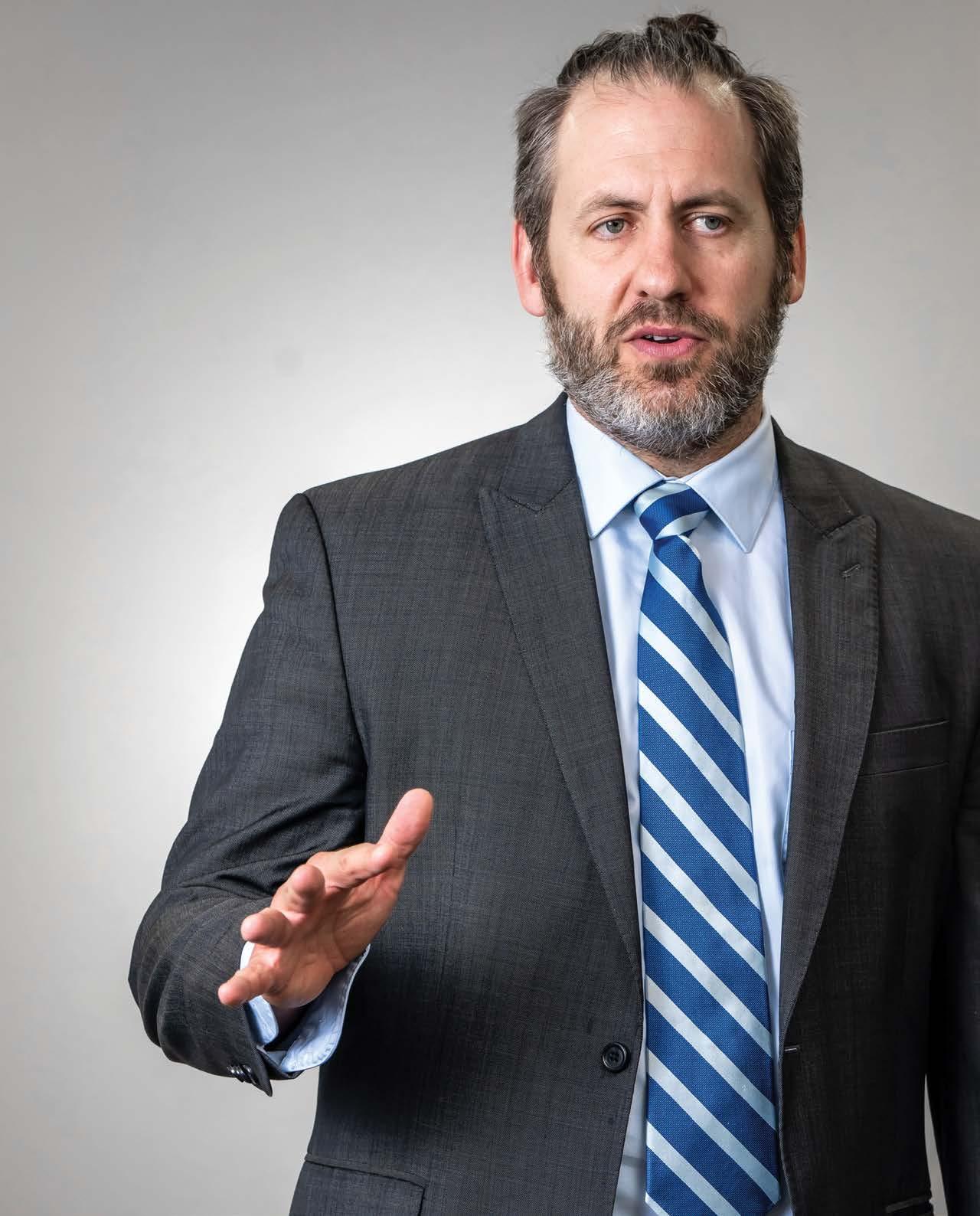
I love economics and yet I know I would not be able to meaningfully participate in any economic or social activity without first having my basic physiological needs met if not exceeded. In my teaching, research and service, I strive to demonstrate the importance of viewing the economy as embedded within the natural environment so that future generations of humans can find a way to live sustainably within a world of finite resources.

To gain insight into how organizations function, it is critical to grasp the dynamics of both the organizations and individual employees, who constitute the smallest units of an organization. This insight holds significant value within business communities as well as academia, which is why I am committed to helping my students cultivate these perspectives.

Associate Professor, Management & Operations
Kevin J. Hughes Family Endowed Senior Research FellowFor another example, Dr. Kim and his co-author investigated how firms can reduce the occurrence of financial misdeeds among firms. Their research was published in the Journal of Applied Psychology in 2023. The findings reveal that employee stock ownership that offers both monitoring and incentive benefits plays a crucial role in curbing financial misdeeds, especially when a significant proportion of employees own firm stock. They also found that this curbing effect is more pronounced in small firms. These discoveries offer valuable practical contributions to the business community because firms invest substantial financial and non-financial resources to monitor employees and prevent unethical actions.
Fulfilling South Korea’s mandatory military service, Kyoung Yong Kim, PhD, served as an auxiliary riot policeman for a year. He was then recruited and transferred to the Seoul Metropolitan Police Agency, where he spent another year working in the security division strategizing riot police deployment. At these two different levels, he acquired valuable insights and developed an understanding of actions from both individual and organizational perspectives. With parents and grandparents as educators, it was not surprising that he wanted to delve deeper into these perspectives and explore how they influenced organizational actions and outcomes. He pursued a PhD in Management to satisfy his curiosity.
Dr. Kim’s research interests encompass strategic human capital, strategic leadership, employment relationships, diversity, and entrepreneurship at both macro (firms) and micro (employees) levels. His research has been published in top-tier journals, including the Journal of Applied Psychology and Organization Science. A shared element in much of his research is its substantial practical relevance and societal impact. For example, in his 2022 Journal of Applied Psychology article, he and colleagues found that when firms value employees’ contributions and care about their well-being, firm profitability increases due to improved workforce performance and reduced voluntary turnover rate. Additionally, they discovered that when firms possess limited resources, the performance effect of valuing employees becomes even stronger. Given that many companies have recently engaged in widespread layoffs, the research suggests that firms should carefully consider layoff practices that they have used in the past to potentially (but often temporarily) boost stock prices.
In his 2020 article in Group and Organization Management, he and his colleague tackled a long-standing question: why do women encounter difficulties advancing beyond relatively low-level management positions, even though more organizations are developing a gender-equality climate? Their research uncovered that female leaders with high self-efficacy in environments with strong gender equality climates tend to focus on enhancing firm-specific human capital, while their male counterparts in similar contexts aim to develop general human capital. Interestingly, only general human capital was found to be positively related to promotion. These findings suggest that female and male leaders employ different strategies in directing their efforts toward achieving promotions, and these differing strategies can lead women into a vicious cycle of working hard while experiencing unfavourable outcomes without promotions.
Due to its valuable practical implications and societal impact, his research has received numerous recognitions. Notably, his 2016 article in Journal of Applied Psychology was ranked among the top 10 studies with significant practical implications for the world of work out of approximately 1,000 articles published in 2016 in the top 15 most prestigious industrial and organizational psychology journals.
Kim, K. Y., & Patel, P. (2023). Nonlinear effect of employee ownership on organizational financial misdeeds: The moderating role of organizational size. Journal of Applied Psychology. https://doi.org/10.1037/apl0001148.
Kim, K. Y., Clark, K. D., & Messersmith, J. G. (2023). High performance work systems and perceived organizational support: The contribution of human resource department’s organizational embodiment. Human Resource Management, 62, 181-196.
Kim, K. Y., Eisenberger, R., Takeuchi, R., & Baik, K. (2022). Organizational-level perceived support enhances organizational profitability. Journal of Applied Psychology, 107, 2176-2196.
Kim, K. Y., & Patel, P. (2021). A multilevel contingency model of employee ownership and firm productivity: The moderating roles of industry growth and instability. Organization Science, 32, 625-648.
Kim, K. Y., Atwater, L., Jolly, P. M., Kim, M., & Baik, K. (2020). The vicious cycle of work life: Work effort or career development effort. Group and Organization Management, 45, 351-385.
Kim, K. Y., Atwater, L., Patel, P. C., & Smither, J. W. (2016). Multisource feedback, human capital, and the financial performance of organizations. Journal of Applied Psychology, 101, 1569-1584.
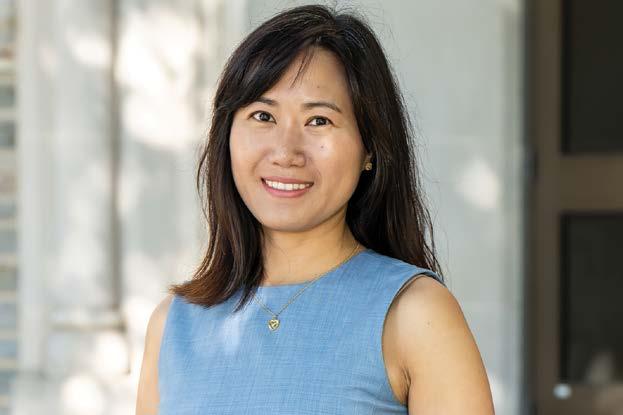
As the daughter of a high school teacher, Lily Yuanzhi Li, PhD, always wanted to be an educator. She earned her BA in Finance from Beijing University and her PhD in Finance from the Stern School of Business at New York University. She first worked in BlackRock’s portfolio-management department, earning practical insights into the assetmanagement industry, before transitioning to academia to teach and research financial economics. She currently serves as the Diana and Thomas Klein ‘84 VSB Assistant Professor in the Finance & Real Estate Department at VSB; she particularly finds resonance with the integrated teacher-scholar model.
Dr. Li’s research interests span a wide range of topics, mostly in corporate finance and asset management. Driven by her desire to conduct research with societal impact, her work either aids in governance policymaking or sheds light on neglected pitfalls of mutual fund investing. She has published in leading academic journals such as Journal of Financial Economics, Review of Financial Studies and Management Science. Her work was also featured in professional research forums and financial news outlets such as the NBER Digest, the Wall Street Journal, the New York Times, CBS MoneyWatch and the Washington Post.
One of her projects asks whether corporate governance matters more for some firms than others, especially in light of the passage of state-level anti-takeover laws that may have the unintended effect of entrenching managers and weakening shareholder governance. Dr. Li and her coauthors find that the laws’ passage has a larger negative
impact on the operating and stock market performance of high financial-slack firms (firms with more cash on hand). The findings suggest that shareholder activism and government regulations aiming to improve governance can be more efficient by focusing on firms with high financial slack.
With David Yermack, Dr. Li studied another key aspect of governance: shareholder meetings. They find that when companies move their annual meetings a great distance from headquarters, they tend to experience pronounced stock market underperformance afterwards. This suggests that these managers possess private, adverse information about future performance and wish to discourage scrutiny by making it more difficult to attend shareholder meetings. The paper calls for more regulatory scrutiny for shareholder meetings. Their findings have been widely covered by major news outlets.
Dr. Li is also interested in “delegated” investing. She and two coauthors are currently working on a project that uncovers novel evidence on how yield of bond mutual funds drives investors’ capital flows into and out of the funds, influenced by interest rates and credit risks in the bond markets. These results point to increased fragility in the bond-fund sector when monetary policy turns from a long period of accommodation into aggressive tightening— timely, given the policy shift recently adopted by the Fed.
Dr. Li is currently working on several other projects related to corporate social responsibility, corporate innovation, mutual-fund voting and IPO underpricing. She thinks of conducting impactful research as just another aspect of being an educator. By bringing more knowledge and deeper understanding of how the world works, there lies the hope that we will live in a better world tomorrow.
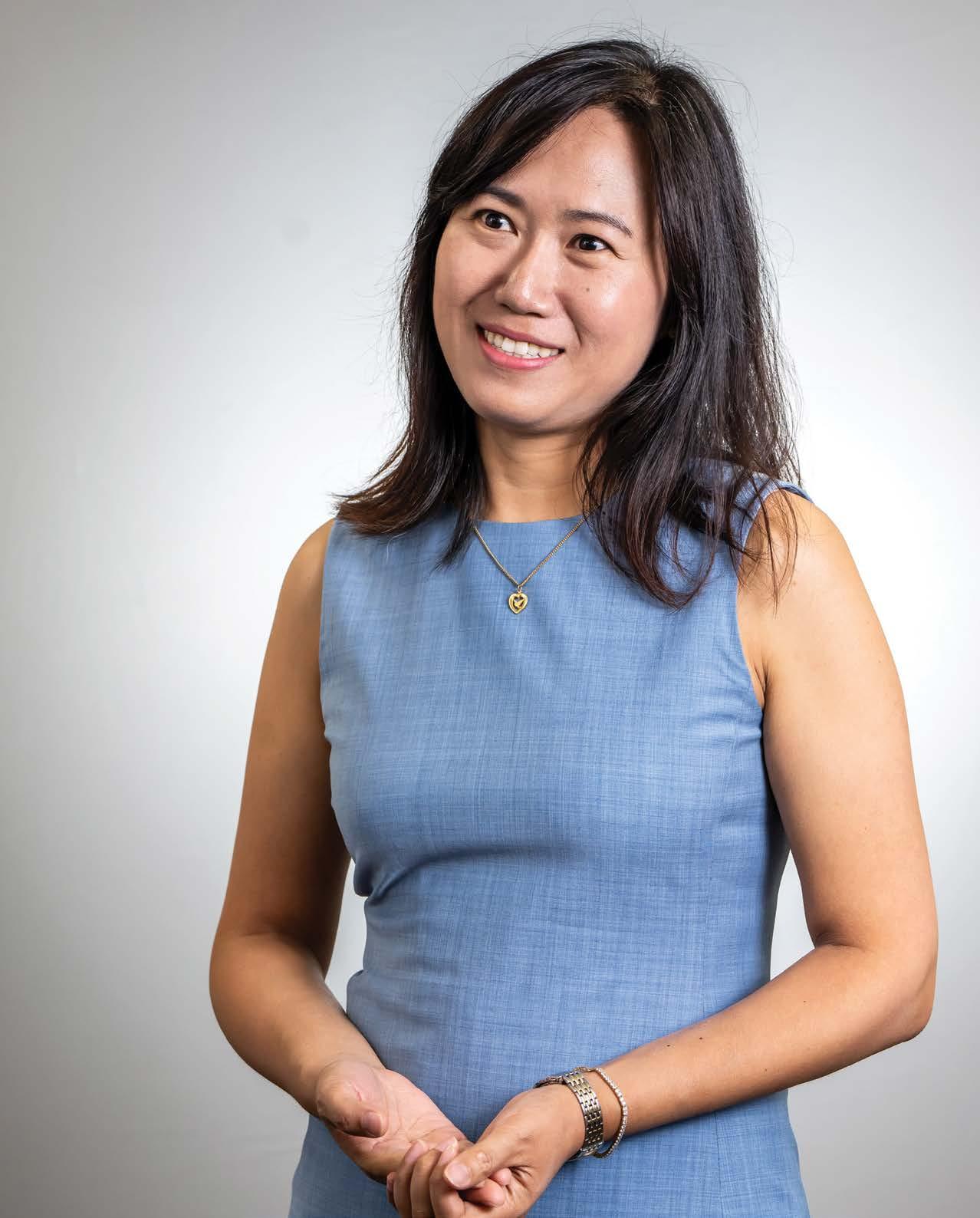
Conducting research in finance is intriguing because the financial landscape is constantly evolving. Whether it’s about the optimal structure of executive compensation or the unintended consequence of lax monetary policies on excessive risk-taking, the financial world offers ample opportunities for discovery. Impactful research does not just follow the industry practice but informs policy decisions and offers guidance on pressing issues, such as sustainable investing.

I am grateful for the tremendous support of my mentors for helping me apply my marketing experience to understudied areas of brand communication. It’s also incredibly inspiring to be here at Villanova surrounded by world-class scholars dedicated to solving real-world problems toward making a positive societal impact.
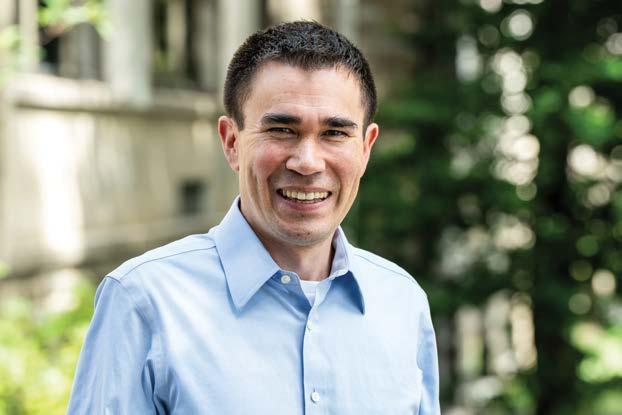
Tyler Milfeld, PhD, grew up wanting to be a writer. Like his mother, an avid reader who studied comparative literature, Dr. Milfeld enjoyed reading everything from great American novels to biographies to short stories. He channeled his passion for words into a marketing and sales career focused on making brand communication more engaging and resonant. Dr. Milfeld yearned to combine his passion for writing and constant curiosity for how consumers react to words and phrases, which motivated him to pursue research on brand communication and societal impact. He earned his PhD from the University of Tennessee, Knoxville; MBA from the University of Texas at Austin and Pontificia Universidad Católica de Chile; and BA from Northwestern University.
Dr. Milfeld’s research draws on real-world advertising challenges in the corporate social responsibility arena. One of his initial projects was a collaboration with Dave’s Killer Bread on introducing their purpose—Second Chance Employment—to consumers. Dr. Milfeld proposed that framing support for ex-offenders around a positive, shared idea could shift attitudes toward this stigmatized group. The campaign exceeded all forecasted metrics. The resulting paper was named the best article in the Journal of Advertising in 2021.
Another study, published in the International Journal of Advertising, studied Coca-Cola’s assertive ad headline “Don’t Buy Coca-Cola If You Don’t Recycle the Bottle.” Drawing on altercasting theory, a persuasion technique in which one person casts another as a certain type of person in order to prime him or her to behave in a desired manner, Dr. Milfeld and his co-author identified that framing the
message with the simple statement, “You are a responsible consumer,” significantly enhanced attitudes toward the brand. Relatedly, brands promoting green tips inspired a forthcoming study in the Journal of Advertising Research investigating how the number of tips offered influences green behavior.
In addition to message-framing work, Dr. Milfeld was one of the first researchers to examine consumer responses to brand activism. One study, published in the Journal of Advertising, applied the political science concept of issue salience to develop a novel framework, finding that a brand can gain consumer support by advertising a non-salient issue. Another study, forthcoming in the Journal of Advertising Research, showed that brands with a history of activism are perceived to be more credible when taking a stand versus emergent activist brands. Dr. Milfeld’s current projects include understanding when questions are more effective than statements in green advertising, investigating how campus food pantries can improve their websites, and devising a new framework for the unintended effects of prosocial communication.
Pittman, M., Milfeld, T., & Yoon, K. (2023). Why a single pro-environmental appeal works to promote behavioral change. Journal of Advertising Research, forthcoming.
Milfeld, T., & Haley, E. (2023). Purpose advertising and the credibility gap: How consumers respond to established versus emergent brand activist messaging. Journal of Advertising Research, forthcoming.
Milfeld, T., & Pittman, M. (2023). Altercast framing with assertive sustainability messages: How dominant brands can motivate non-green consumers. International Journal of Advertising, forthcoming. 43(1), 173-201.
Milfeld, T., Flint, D. J., & Zablah, A. R. (2022). Riding the wave: How and when public issue salience impacts corporate social responsibility advertising. Journal of Advertising, forthcoming. 53(1), 148-159.
Milfeld, T., Haley, E., & Flint, D. J. (2021). A fresh start for stigmatized groups: The effect of cultural identity mindset framing in brand advertising. Journal of Advertising, 50(5), 603-621

Janice Sipior grew up in North Tonawanda, NY, an industrial town on the Niagara River near Buffalo.
Growing up, she experienced first hand the decline of American manufacturing—and later, the rise of information technology (IT) as a more services-driven economy arose. After graduating Canisius University, she joined HSBC in its IT department, where she enjoyed programing and problem solving. While at HSBC, she earned her MBA, followed by a PhD in Management Information Systems, both at SUNY Buffalo. After receiving her PhD, she accepted a faculty position at the University of North Carolina at Greensboro. Two years later, she joined the VSB faculty.
The heightened role of IT in most aspects of contemporary society led Dr. Sipior to do research on ethical, societal and related legal issues involving the use of IT. Her research, which has been published in Information Systems Management, Journal of Information Systems, Communications of the AIS, and other leading outlets, has tackled issues including privacy, legal issues, the digital divide, gender, control of information and, most recently, bias in artificial intelligence (AI). In addition to publishing her research, she has been editor-in-chief of the journal Informational Systems Management since 2007.
Her research examining the issue of personal privacy in business and personal email was published in the Communications of the ACM. Personal emails sent using an employer’s email system are not private, and even emails sent using non-employer systems can be accessed by subpoena, civil and criminal discovery, and hackers. Further, electronically stored and transmitted information may result in privacy intrusions through cookies and
malware. Our legal system has struggled to keep pace with the issues created using IT, and Dr. Sipior’s research shows that at minimum, individuals and organizations need to be concerned about liability, compelled disclosure of stored information through discovery, and jurisdiction in a global environment.
Another focus of Dr. Sipior’s research has been on the divide between the haves and have nots of the digital world. Increasingly, access to education, employment, governmental services and participation, societal interaction, and more will not be available to those without digital access, leaving them behind. With the Unity Center, a nonprofit Christian organization, Dr. Sipior ran a VSB service-learning program at a housing project in Chester, Penn. Participating residents were eager to learn about using computers and the internet, and they appreciated the students’ efforts.
Most recently, Dr. Sipior has been researching bias in AI, including both predictive and generative AI. While some claim that human bias is eliminated by using AI, bias can be built into AI through the inputs and development process used to develop the algorithms. Her research focus has been on audit bias and AI bias in recruiting and hiring—an issue so impactful that New York City now requires the AI system itself be audited annually for bias.
The development and ubiquitous use of IT has significantly benefited society, but it has also been harmful. Dr. Sipior’s research raises issues that have significant societal impact and should be addressed by developing industry standards, reasonable legislation and regulation, and proactive defensive action by individuals and organizations.
Sipior, J. C., Ward, B. T., Rusinko, C.A., & Lombardi, D. R. (2023). Bias in using AI for recruiting: Legal considerations. Information Systems Management. doi.org/10.1080/1058 0530.2023.2294453
Lombardi, D. R., Sipior, J. C., & Dannemiller, S. (2023). Auditor judgment bias research: A 50-year trend analysis and emerging technology use. Journal of Information Systems, 37(1), 109-141.
Sipior, J. C. (2021). Monitoring remote employees at FinPro. Communications of the Association for Information Systems, 49(14), 304-320.
Sipior, J. C., Lombardi, D. R., & Gabryelczyk, R. (2021). AI recruiting tools at ShipIt2Me.com. Communications of the Association for Information Systems (AIS), 48(39), 443-455.
Sipior, J. C. (2020). Considerations for development and use of AI in response to COVID-19. International Journal of Information Management, 55, 1-6.
Ward, B. T., Sipior, J. C., & Volonino, L. (2016). Internet jurisdiction for e-commerce. Journal of Internet Commerce, 15(1), 1-17.
Sipior, J. C., Ward, B. T., & Connolly, R. (2011). The digital divide and t-government in the United States: Using the technology acceptance model to understand usage. European Journal of Information Systems, 20(3), 308-328.

Technology continues to rapidly advance. The arrival of GenAI is transforming the way we work by facilitating the creation of audio, video, text and other media. While empowering us to become more creative and productive, we must, as with all technologies, be vigilant in embracing its use ethically and responsibly for the advancement of society.

It’s great to be at Villanova, where research, teaching and experiences that relate to societal impact are important. That’s rare among business schools.

Luke Watson, PhD, became interested in corporate environmental, social and governance (ESG) activities during his undergraduate studies at Notre Dame. At that time, in the early 2000s, corporate social responsibility (CSR)—the precursor to ESG—was already part of classroom conversations. Dr. Watson also discovered an interest in corporate taxation around the same time. A decade later, when he was studying for his doctorate, he decided to combine these interests; a challenge, however, was that CSR had not yet made its way into mainstream accounting research. Nonetheless, Dr. Watson had the interest and the ambition to try something new.
Dr. Watson first wanted to know whether and how corporate tax avoidance and CSR are related. Both tax payments and ESG have the potential to enrich nonshareholders, with a natural tension that this enrichment might come at shareholders’ expense. Meanwhile, ESG and taxes differ insofar as the corporation controls its ESG activities but cannot control how tax revenues are spent. Even more intriguing, existing theory does not offer a clear prediction on how tax avoidance and ESG should relate, and as Dr. Watson studied the relationship, he determined that it depended on profitability.
From Dr. Watson’s initial study and a few contemporaneous studies, the literature on corporate tax avoidance and ESG erupted, with many publications claiming competing results. Dr. Watson teamed up with Michael Mayberry, Phd (University of Florida) to identify a superior setting in which to revisit the research question. Dr. Watson and Dr. Mayberry used the enactment of state constituency statutes as a natural experiment—these statutes loosen the fiduciary duty of corporate directors to work for the
sole benefit of shareholders and allow directors to also consider non-shareholder interests. Based on this new, stronger research design, Dr. Watson concluded that there was little, if any, relation between ESG performance and tax avoidance. The decoupling of ESG and taxes is intuitive if one considers the compensation and job duties of corporate tax directors and chief sustainability officers, respectively: the two functions don’t intersect often. However, this generalization may not apply in every corporation, and may change with time, so the line of research continues.
Tax payments and ESG activities each offer a path by which corporations can allocate resources for societal impact. “The big picture is that corporations can improve society in many ways, but we shouldn’t necessarily overgeneralize by believing that because a corporation does ESG or pays its taxes, that they are doing everything right,” Dr. Watson says. “Too often, ESG might be viewed as a panacea."
Watson, L. (2015). Corporate social responsibility, tax avoidance, and earnings performance. Journal of the American Taxation Association, 37(2), 1–21.
Huang, X.B., & Watson, L. (2015). Corporate social responsibility research in accounting. Journal of Accounting Literature, 34, 1–16.
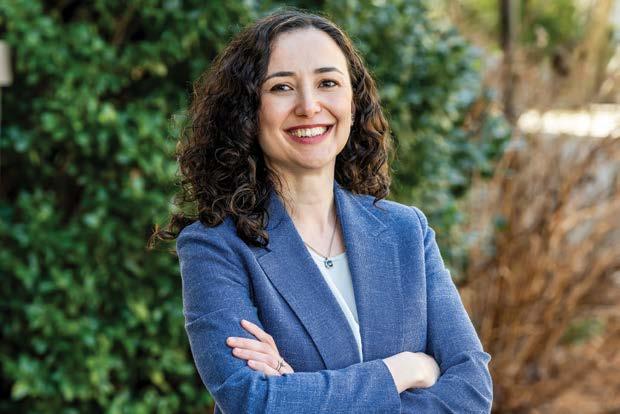
Sovereign debt crises adversely affect society by disrupting financial markets, fostering economic instability, exacerbating unemployment and ultimately leading to a diminished quality of life. Zeynep Yom, PhD, the Lisa D’Alessandro ’87 Assistant Professor, became interested in the topic when, as a high school student at the American Robert College of Istanbul, she personally experienced the financial crisis in Turkey (known since 2022 as Türkiye). During that time, the Turkish lira was devalued by more than 50%, the inflation rate exceeded 70% and output declined by 8.5%. Due to the financial strain on families whose earnings were in Turkish liras, some of her classmates had to give up their aspirations of attending college in the US and instead chose to pursue their studies within Türkiye. That experience motivated Dr. Yom to pursue a PhD in economics.
The main focus of her research lies in understanding economic and financial crises; measuring their impact on production, innovation and employment; and exploring optimal policies to mitigate the associated problems. In her view, a comprehensive understanding of the causes and transmission mechanisms of these crises is crucial for proposing effective policies to alleviate adverse outcomes. Dr. Yom’s research has been published in several highly ranked journals, including the Journal of Money, Credit and Banking ; the Journal of Economic Dynamics and Control ; and the European Economic Review
One facet of her scholarship investigates the relationship between rising income inequality and sovereign default. Dr. Yom demonstrates that increasing income inequality heightens the risk of default, showing that more
progressive tax regimes reduce inequality and the risk of sovereign default. These findings and policy implications were recognized by the Human Rights Council of the United Nations on January 12, 2016, and extensively discussed in the Report of the Independent Expert on the effects of foreign debt and other related international financial obligations of states on the full enjoyment of human rights. In addition, Dr. Yom received the David B. Houston Human Rights and Social Justice in Latin America Scholarship in 2015 from University of Pittsburgh for the contributions of this research.
In another strand of her research, motivated by the European debt crisis between 2009 and 2010, she studies the economic conditions under which banking and sovereign debt crises may occur together, and whether government intervention, specifically through bank bailouts, is warranted. Government bailouts have been considered controversial due to concerns about moral hazard—the risk that they may encourage profligate fiscal management—as well as fairness. The main finding of that research shows that economies may be better off without bailouts, as they tend to reduce overall welfare. This research has been prominently covered by the Dallas Fed’s widely followed Economics blog.
She has also examined the relationship between innovation, market power and labor market dynamics. Dr. Yom’s research indicates that policymakers should reassess the trade-offs associated with promoting research and development (R&D). While R&D is crucial for technological advancement and economic growth, its effect on labor market volatility should be considered when designing economic policies. Particularly, R&D-driven growth could amplify volatility in employment.
Aysun, U., Guldi M., Honig A., & Yom (nee Kabukcuoglu), Z. (2023). R&D, market power and the cyclicality of employment. Journal of Money, Credit and Banking. doi: https://doi. org/10.1111/jmcb.13091
Aysun, U., & Yom (nee Kabukcuoglu), Z. (2021). R&D characteristics, innovation spillover, and technology-driven business cycles. Journal of Industry, Competition and Trade, 21, 339–365.
Aysun, U., & Kabukcuoglu, Z. (2019). Interest rates, R&D investment and the distortionary effects of R&D incentives. European Economic Review, 111, 191–210.
Kabukcuoglu, Z. (2019). The cyclical behavior of R&D investment during the Great Recession. Empirical Economics, 56(1), 301–323.
Aysun, U., Jeon K., & Kabukcuoglu, Z. (2018). Is the credit channel alive? Firm-level evidence on the sensitivity of borrowing spreads to monetary policy. Economic Modelling, 75, 305–319.
Jeon, K., & Kabukcuoglu, Z. (2018). Income inequality and sovereign default. Journal of Economic Dynamics and Control, 95, 211–232.
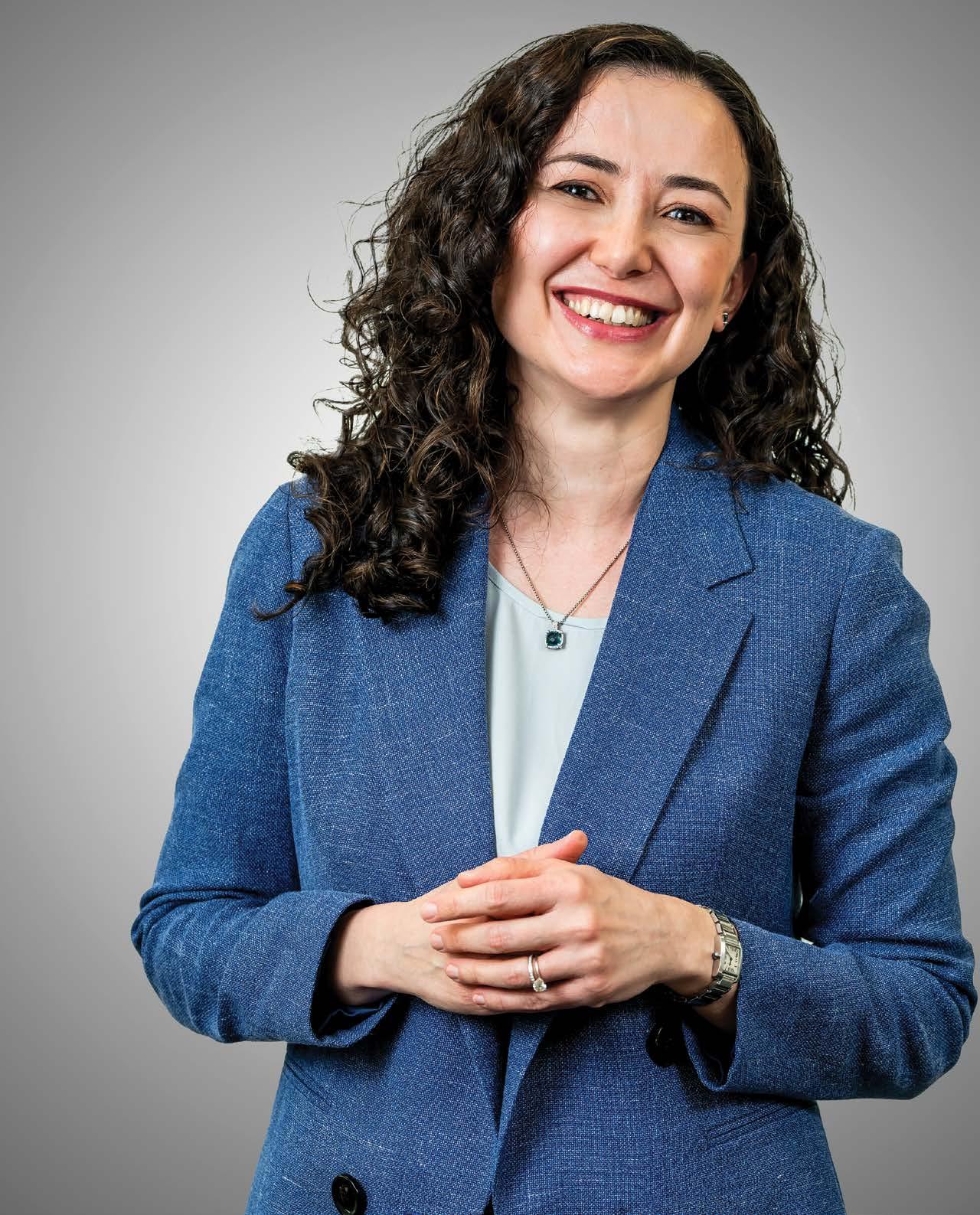
My goal is not only to make a significant contribution to the field but also to present novel findings that address the welfare of society.

Academic finance research can make a societal impact by providing answers to pressing social problems, such as ESG concerns, but also by producing fundamental knowledge about how to efficiently allocate scarce resources. By directing capital to its most productive use, we can grow the economic pie and improve welfare for all people.
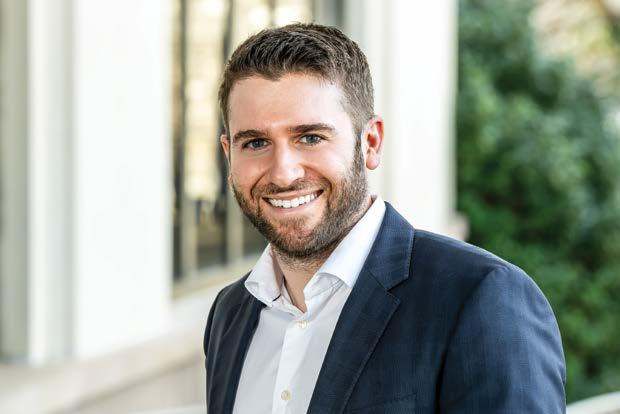
The Kenneth ’84 and Pamela Roessler Assistant Professor, Finance & Real Estate
Thomas Griffin, PhD, ’13 CLAS, first noticed the potential for academic research to have societal impact when he was an undergraduate student at Villanova University. During his junior year, Dr. Griffin took a Research Methods in Economics course taught by Mary Kelly, PhD, ’83 VSB that focused on how economists test applied research questions such as whether minimum wage increases have a negative effect on employment. It also ignited a passion for policy-relevant research that was further strengthened during his time as a research assistant for Peter Zaleski, PhD. Drawing on this experience, Dr. Griffin wrote a senior thesis titled “The Determinants of Mortgage Delinquency Rates: Evidence from the Nonprime Mortgage Market” that won Villanova’s Adam Smith Research Paper Competition and the ODE Economics Honors Society Frank W. Taussig Undergraduate Research Award. Together, these experiences motivated Dr. Griffin to pursue a doctoral degree and set the foundation for his future research agenda.
After receiving a PhD in Finance from Drexel University, Dr. Griffin rejoined the Villanova community as an assistant professor of Finance. He primarily conducts research in corporate governance, a field of finance that examines the ways in which investors ensure a return on their investment. Dr. Griffin’s research in this area examines mechanisms that stakeholders use to limit managerial excess and influence firm behavior. His articles have been published in leading academic journals, including the Review of Financial Studies and the Journal of Financial and Quantitative Analysis, and presented at over 60 conferences and seminars around the world. Dr. Griffin’s research has also
been presented to regulatory agencies, such as the Federal Reserve and the Securities and Exchange Commission, and cited in testimony to the US House Committee on Financial Services about the emerging risks of leveraged lending.
His papers on creditor governance study the evolution of corporate loan covenants over the past two decades and examine how lenders use contractual rights to influence firm outcomes. His paper “Creditor Control of Corporate Acquisitions” shows that creditors use contractual rights and the renegotiation process to limit bad investments by management, thereby benefiting shareholders. Despite these benefits, however, Dr. Griffin finds that these loan covenants have substantially loosened over time. One of his papers shows that the annual proportion of US public firms that report a financial covenant violation fell roughly 70% between 1997 and 2019. He develops a model to explain this decline and shows empirically that the dramatic fall in violations is best attributed to looser but higher-quality covenants. These results help alleviate concerns voiced by policymakers about financial stability risks posed by excessively loose covenants.
Dr. Griffin also conducts corporate finance research on environmental, social and governance (ESG) issues. One project, supported by the Villanova UNITAS Faculty Research Award, examines workplace discrimination lawsuits filed in federal court. The data shows that large firms are more likely to be the target of discrimination cases: the top 100 firms defend 49% of all discrimination cases despite contributing only 24% of total employment. Firms in the manufacturing sector or headquartered in the Southeast are roughly twice as likely to face a discrimination suit as firms in the health care industry or headquartered in the Northwest. These results can best be explained by differences in corporate culture: litigation rates are inversely correlated with corporate social responsibility (CSR) scores and fall after the appointment of a female CEO. Collectively, Dr. Griffin's findings suggest that discrimination is ingrained in employee culture and unlikely to be disciplined by market forces.
Becher, D. A., Griffin, T. P., & Nini, G. (2022). Creditor control of corporate acquisitions. The Review of Financial Studies, 35(4), 1897-1932.
Dougal, C., Griffin, T. P., & Hutton, I. (2023). A culture of discrimination: Evidence from civil rights litigation against US corporations. SSRN: http://dx.doi.org/10.2139/ssrn.3967456.
Griffin, T. P., Nini, G., & Smith, D. C. (2023). Losing control? The two-decade decline in loan covenant restrictions. SSRN: http://dx.doi.org/10.2139/ssrn.3277570.
Griffin, T. P. (2023). Where have all the IPOs gone? Trade liberalization and the changing nature of US public corporations. Journal of Financial and Quantitative Analysis, forthcoming.

The Vincent B. DiDomenico, Jr. ’88 Assistant Professor, Accounting & Information Systems
Karen Ton, PhD, CPA, is a first-generation college graduate. After four years of learning about scientific research protocols and conducting several research projects in high school, she realized she wanted to work in a business environment rather than a science lab. This led her to study accounting and finance as an undergraduate at the University of Southern California. Her five years at PricewaterhouseCoopers during a period of intense regulatory changes and her professional experience as a certified public accountant (CPA) inspired her interest in understanding the importance and consequences of public policy and regulation. This motivated her to return to the University of Southern California to earn her PhD.
Dr. Ton’s primary research focus is related to financial reporting, auditing and regulation. She has a stream of research that examines the intended and unintended consequences of regulation on financial reporting and audit quality. Dr. Ton’s research has been published in prestigious accounting journals such as The Accounting Review and Journal of the American Taxation Association and is forthcoming at Contemporary Accounting Research and Review of Accounting Studies. She is also on the editorial board for Auditing: A Journal of Practice & Theory
Her recent work investigates how accounting information and disclosures affect stakeholder decisions. One study that has been accepted at Review of Accounting Studies examines some of the unintended consequences of speaking out on divisive political and social issues. Dr. Ton’s study examines customer responses to publicly traded firms speaking out in response to controversial U.S. voting
reform laws such as Georgia’s 2021 Election Integrity Act. The study shows that for firms that speak out, customer visits and visitors at stores decrease relative to the stores of firms that do not speak out. The decrease in customer traffic is stronger for stores in Georgia and also varies with the political affiliation of counties and whether speaking out was emphasized by media sources. The results are weaker for stores in counties with more diverse populations.
One of Dr. Ton's current research projects examines whether ethics requirements for obtaining or maintaining a CPA license affect the CPA’s behavior as an auditor. Some states have enacted ethics-related requirements for CPAs in an attempt to strengthen auditor independence, which plays a critical role in ensuring the integrity of the accounting profession. Her research finds that more extensive ethics requirements strengthen auditor independence, which improves audit quality.
Dr. Ton is currently the Vincent DiDomenico, Jr ’88 Assistant Professor at Villanova University’s School of Business. She teaches financial accounting to undergraduates. She was awarded the Crystal Apple for Excellence in Undergraduate Business Education at Emory University and received the Mary Pickford Foundation Doctoral Teaching Award at the University of Southern California.
Erickson, M. M., Ton, K., & Wang, S. (2019). The effect of acquirer net operating losses on acquisition premiums and acquirer abnormal returns. The Journal of the American Taxation Association, 41(2), 103-124.
Ton, K. (2023). Do shared auditors improve audit quality? Evidence from banking relationships. The Accounting Review, 98(1), 423–451.
Jin, H., Merkley, K. J., Sharma, A., & Ton, K. (2024). Customers’ response to firms’ disclosure of social stances: Evidence from voting reform laws. Review of Accounting Studies. https://doi.org/10.1007/s11142-023-09816-2
Heflin, F., Tan, J., Ton, K., & Wang, J. (2023). Does auditor style influence non-GAAP reporting? SSRN: http://dx.doi.org/10.2139/ssrn.4040180
Jin, H., Stubben, S., & Ton, K. (2023). Customer shopping behavior and the persistence of revenues and earnings. SSRN: http://dx.doi.org/10.2139/ssrn.3744417

I am hopeful that studying the real effects of financial reporting can help inform policy development and companies’ reporting of economic, social and corporate governance initiatives. This can ultimately help close the gap between research and practice.

11 ENDOWED CHAIRS
6 ENDOWED PROFESSORS
5
1 ENDOWED SENIOR RESEARCH FELLOW
The Daniel M. DiLella Center for Real Estate, the Elenore and Robert F. Moran Sr. Center for Global Leadership, the Center for Business Analytics, the Center for Church Management, and the Center for Marketing and Consumer Insights
12 NAMED ASSISTANT PROFESSORS
3 2 3
VSB faculty who are recognized by Stanford University and PLOS as among the top 2% of scientists globally
Cutting-edge research labs—The Victoria and Justin Gmelich ’90 Lab for Financial Markets and the Laboratory for Advanced Interdisciplinary Research
120+ UNDERGRADUATE AND MASTER’S STUDENTS
VSB faculty who have been named as among the best undergraduate business professors in the country by Poets&Quants
Who have worked as paid research fellows or research assistants for faculty over the past three years, supporting hundreds of research projects and generating more than 50 publications co-authored by students and faculty
VSB faculty serve as fellows of prestigious scholarly associations such as the Academy of Management, American Academy of Advertising and the Academy of International Business.

The Villanova School of Business (VSB) undergraduate program is top-ranked among business schools in the nation. Its online graduate business programs are ranked #16, and its online MBA program is ranked #19 by U.S. News & World Report. VSB has been at the forefront of business education since it was founded in 1922. Serving over 2,700 undergraduate and graduate students, VSB is home to five Centers of Excellence—the Daniel M. DiLella Center for Real Estate, the Elenore and Robert F. Moran Sr. Center for Global Leadership, the Center for Business Analytics, the Center for Marketing & Consumer Insights, and the Center for Church Management—with each designed to foster innovative, cross-disciplinary research and applied opportunities for students. VSB is known for academic rigor; creativity and innovation; hands-on and service-learning opportunities; a firm grounding in ethics; and an applied education that prepares students to become outstanding leaders and global citizens within the ever-changing, complex and fast-paced world of business. For more, visit business.villanova.edu
